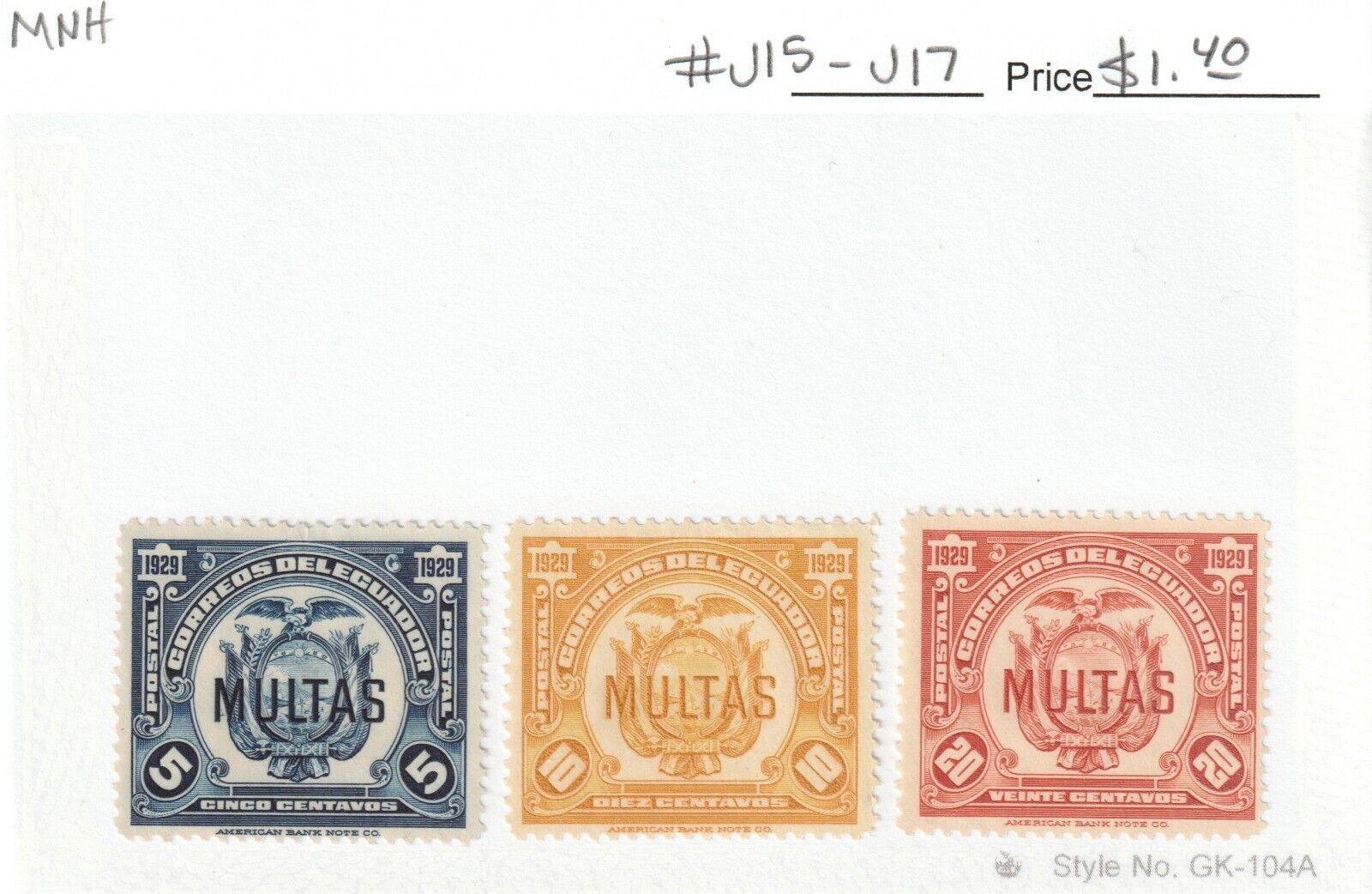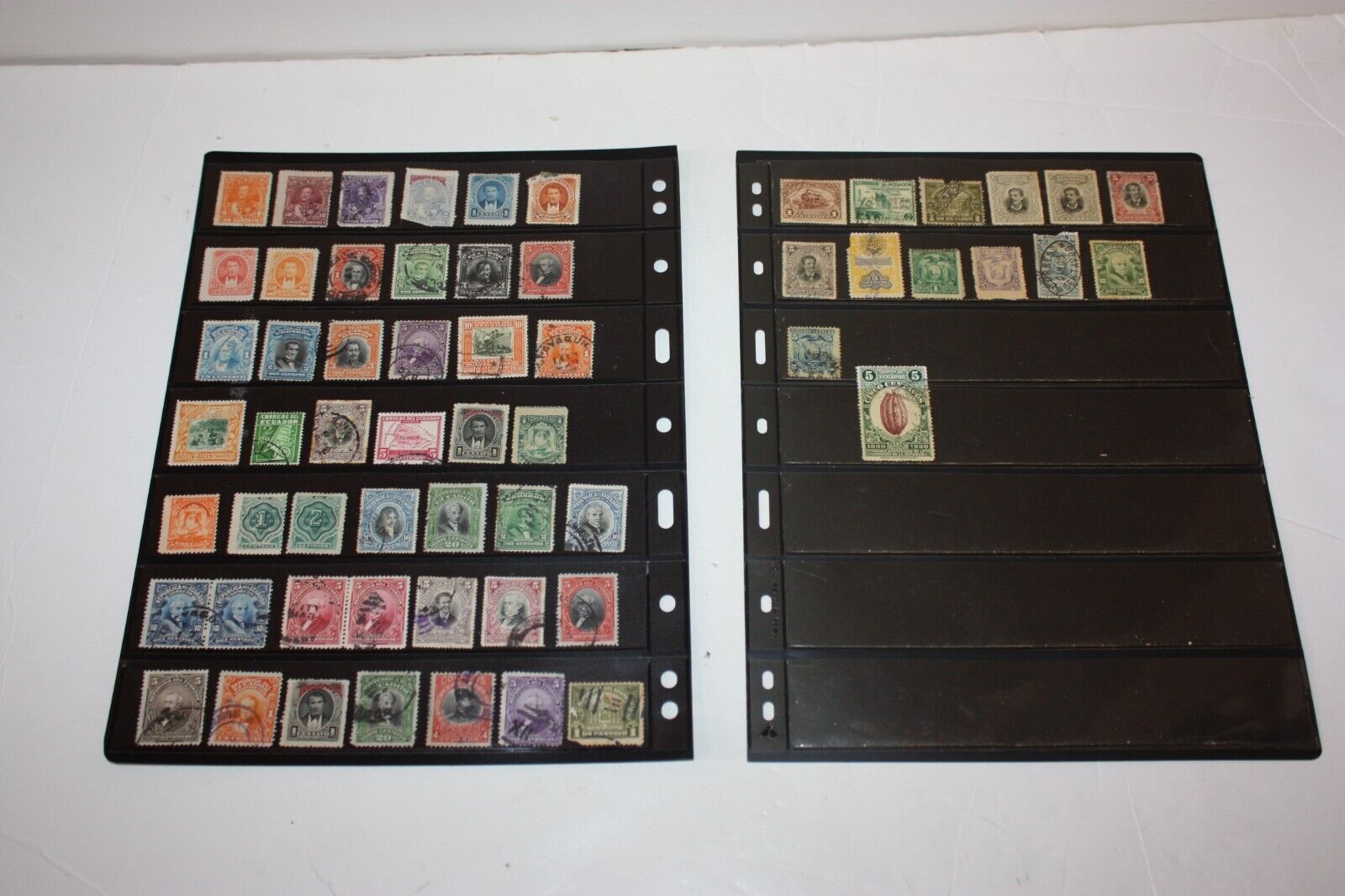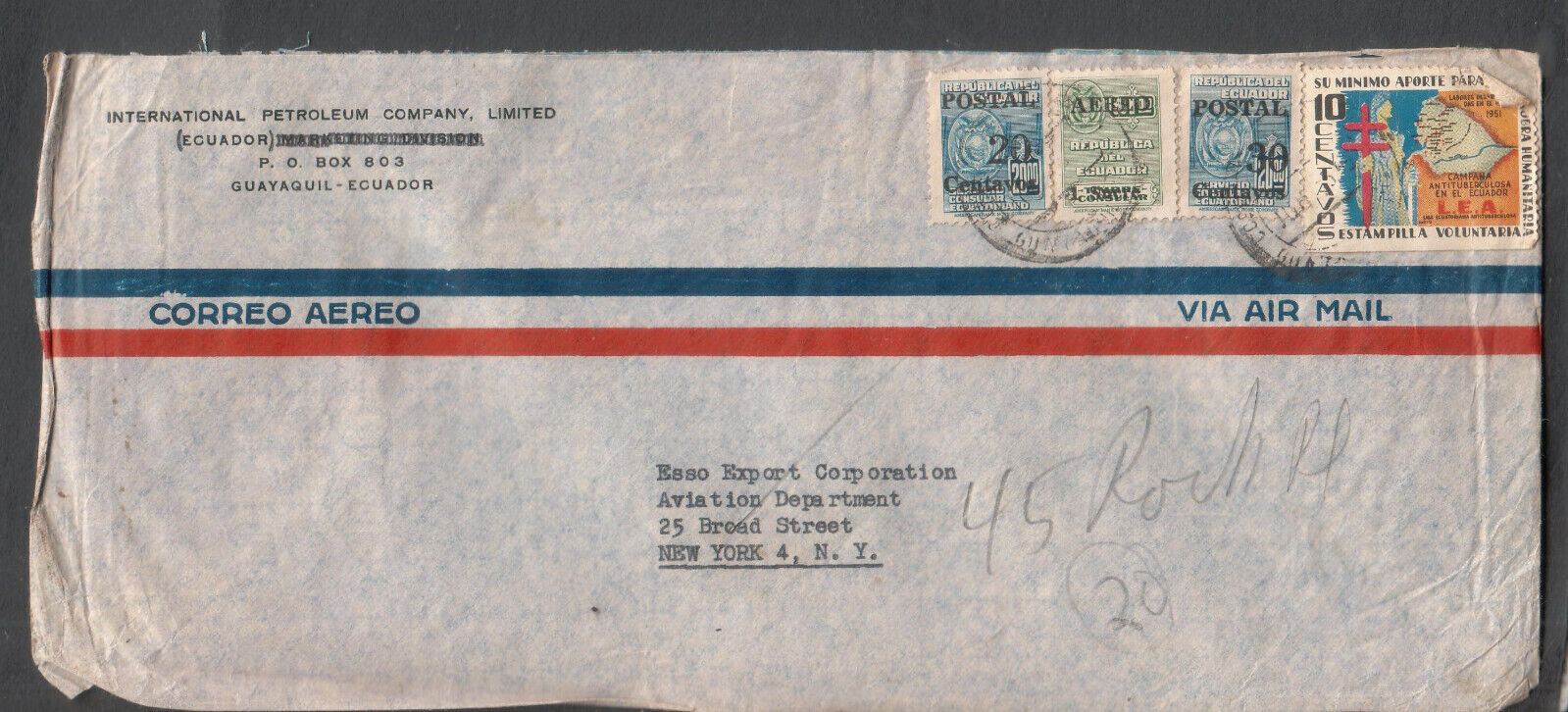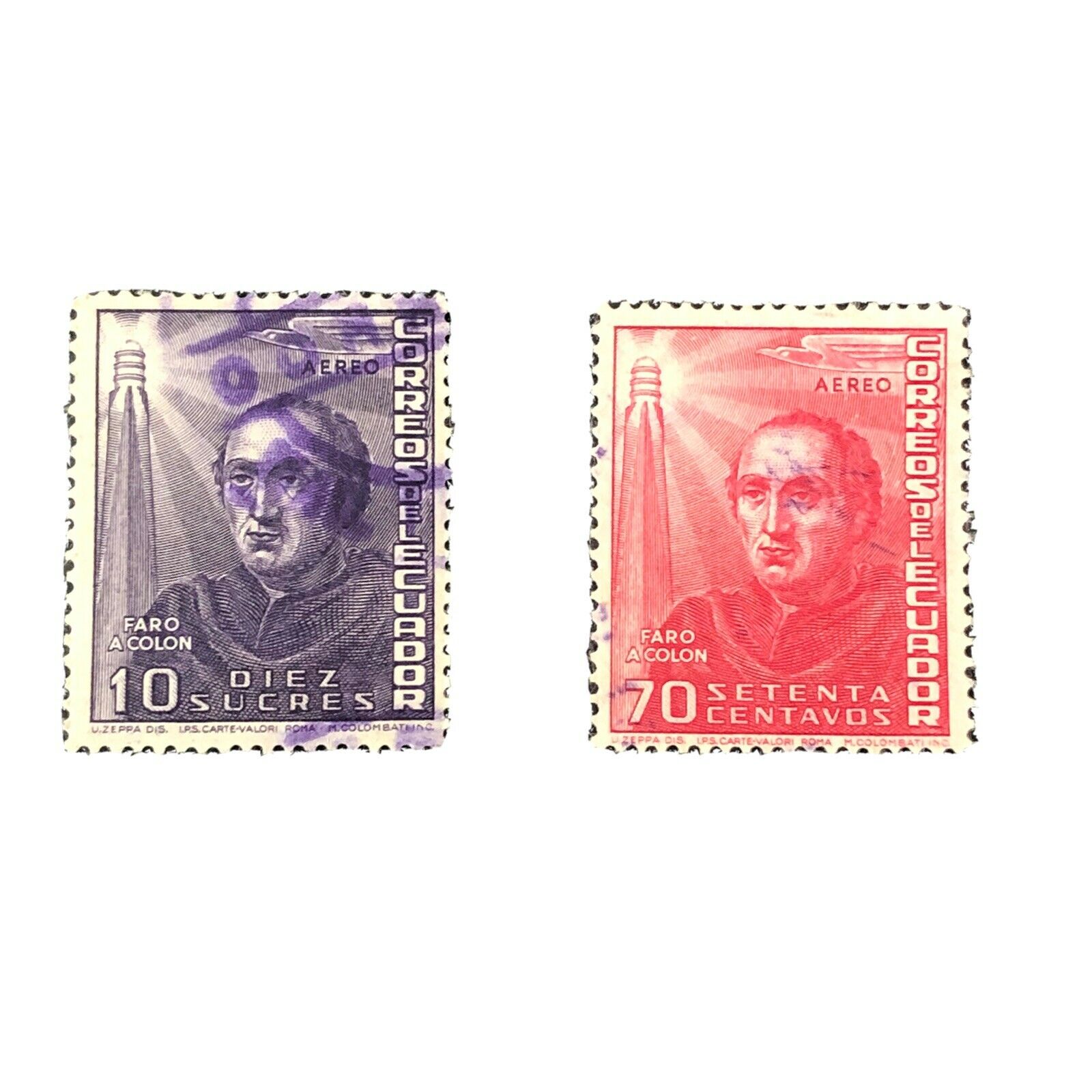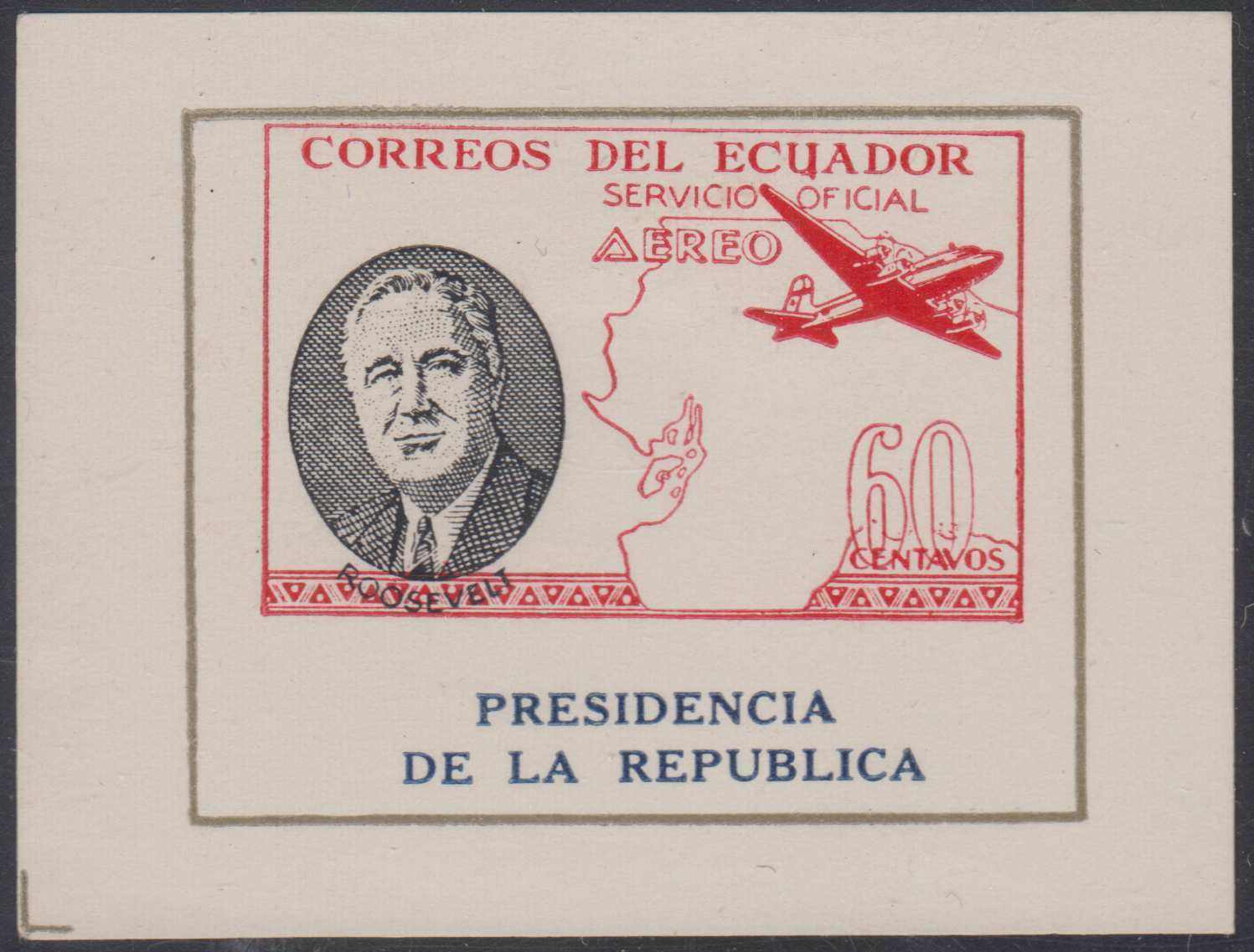-40%
1940s CUENCA ECUADOR Cover CATHOLIC Cardinal Cushing NEWTON CENTRE USA Mass MA
$ 10.55
- Description
- Size Guide
Description
1940s ECUADOR COVERFREE SHIPPING with delivery confirmation on all domestic purchases!
6-1/2" cover from Ecuador with various stamps and cancels at reverse, c1940s.
Addressed to Sacred Heart Rectory, Richard Cushing who would later become Cardinal of the Boston Archdiocese and close friend of the Kennedy family.
We ship worldwide! Please see all pictures and visit
our eBay store and other eBay auctions!
Richard James Cushing (August 24, 1895 – November 2, 1970) was an American prelate of the Roman Catholic Church. He served as Archbishop of Boston from 1944 to 1970, and was created a cardinal in 1958. Cushing's main role was as fundraiser and builder of new churches, schools, and institutions. He was on good terms with practically the entire Boston elite, as he softened the traditional confrontation between the Catholic Irish and the Protestant upper-class. Cushing built useful relationships with Jews, Protestants, and institutions outside the usual Catholic community. He helped presidential candidate John F. Kennedy deflect fears of papal interference in American government if a Catholic became president. Cushing's high energy level allowed him to meet with many people all day, often giving lengthy speeches at night. Cushing was not efficient at business affairs, and when expenses built up he counted on his fund-raising skills instead of cost-cutting. Cushing, says Nasaw, was “fun-loving, informal, and outgoing. He looked rather like a tough, handsome, Irish cop and behaved more like a ward politician than a high church cleric.”[1] His major weakness in retrospect was overexpansion, adding new institutions that could not be sustained in the long run and had to be cut back by his successors.[2]
Cushing was born in South Boston on August 24, 1895.[3] The third of five children, he was the son of Patrick and Mary (née Dahill) Cushing.[4] His parents were both Irish immigrants; his father was originally from Glanworth, County Cork, and his mother from Touraneena, County Waterford.[5] His father, who came to the United States in 1880,[6] worked as a blacksmith and earned per week in the trolley repair pits of the Boston Elevated Railway.[7]
Cushing received his early education at Perry Public Grammar School in the City Point section of South Boston, since there was then no parochial school for boys in Gate of Heaven Parish.[8][9] Cushing dropped out of high school in his freshman year because of his compulsive truancy.[7] He subsequently entered Boston College High School, a Jesuit college preparatory school.[4] His tuition there was paid by his cousin, who was a priest of the Archdiocese of New York.[9] He graduated from high school in 1913, receiving honors for Latin and Greek.[10] Cushing was torn for a time between religion and politics.[7] He originally wanted to be a politician, even earning money by speaking for politicians from the back of wagons.[6] He twice considered joining the Jesuits,[6] but came to the conclusion he "was cut out more for the active life and not the teaching apostolate."[9]
He entered Boston College in 1913, becoming a member of the first freshman class following the college's move to Chestnut Hill.[3] At Boston College, he was active in the Marquette Debating Society and elected vice-president of his sophomore class.[9] Following the sinking of the RMS Lusitania in 1915, Cushing enlisted in the United States Army but was medically discharged for his asthma after a few weeks.[10] After attending Boston College for two years, he began his studies for the priesthood at St. John's Seminary in Brighton in September 1915.[4] He was assigned to continue his studies at the Pontifical North American College in Rome, but the escalation of U-boat activity prevented him from sailing across the Atlantic.[9]
Priesthood[edit]
On May 26, 1921, Cushing was ordained a priest by Cardinal William Henry O'Connell at the Cathedral of the Holy Cross.[11] His first assignment was as a curate at St. Patrick's Church in Roxbury, where he remained for two months.[9] He was afterwards transferred to St. Benedict's Church in Somerville.[9] In 1922, Cushing appeared unannounced at the residence of Cardinal O'Connell to request an assignment as a missionary.[4] The young priest declared he wanted to "take heaven by storm."[6] O'Connell denied his request, and instead appointed him assistant director of the Boston office of the Society for the Propagation of the Faith, an organization dedicated to raising funds for missions.[3] He later served as director of the Society from 1929 to 1944.[3] He was raised to the rank of Monsignor on May 14, 1939.[3]
Episcopal career[edit]
On June 10, 1939, after Bishop Francis Spellman was named Archbishop of New York, Cushing was appointed auxiliary bishop of Boston and titular bishop of Mela by Pope Pius XII.[11] He received his episcopal consecration on the following June 29 from Cardinal O'Connell, with Bishops John Bertram Peterson and Thomas Addis Emmet, SJ, serving as co-consecrators, at the Cathedral of the Holy Cross.[11] He took as his episcopal motto: Ut Cognoscant Te (Latin: "That they may know thee").
As an auxiliary bishop, Cushing continued to serve as director of the Society for the Propagation of Faith, and was also named pastor of Sacred Heart Church[12] in Newton Centre.[9] Following the death of Cardinal O'Connell in April 1944, he served as apostolic administrator of the archdiocese.[3]
Archbishop of Boston[edit]
Cushing was named the third Archbishop of Boston on September 25, 1944, following Cardinal O'Connell's death. During his tenure, Boston would see the excommunication of Fr. Leonard Feeney for his stringent interpretation of the Catholic doctrine that there is no salvation outside the Church. Feeney refused to back down from his position, although it has been reported that he was ultimately reconciled with the church before his death.[13]
After the death of Pius XII, Cushing published a moving tribute to him.[14] In 1959, Cushing published a biography of the late Pope Pius XII (1939–1958), depicting the late pope as "Pope of Peace".
His work contributed to making the Roman Catholic Church acceptable to the general American population at the time of then-Senator John F. Kennedy's run for the White House. Part of this work included reaching out to the non-Catholics of Boston after "the muscular style of involved Catholicism that Cardinal O'Connell brought to bear on issues of his day religious, social, and political in Boston and Massachusetts".[15]
Cushing was created Cardinal-Priest of Santa Susanna by Pope John XXIII in the consistory of December 15, 1958. He was one of the cardinal electors in the 1963 papal conclave, which elected Pope Paul VI.
The Cardinal was a close friend of the Kennedy family. He officiated at the marriage of John F. Kennedy and Jacqueline Lee Bouvier in 1953, at which he also read a special prayer from Pope Pius XII, and baptized many of the Kennedy children. Cushing gave the prayer invocation at Kennedy's inauguration in 1961. The Cardinal also celebrated President Kennedy's funeral Mass in 1963 at St. Matthew's Cathedral in Washington, D.C.
The day before the funeral, he gave a televised eulogy for the President. Cushing later defended Jacqueline Kennedy after her marriage to Aristotle Onassis in 1968. He received a large amount of hate mail and was contradicted by the Vatican.[16]
Biography of Pope Pius XII[edit]
In 1959, Cardinal Cushing published his only book, a biography of the late Pope Pius XII (1939–1958). It is an almost hagiographic biography, written shortly after the death of the Pontiff. Cushing depicted him as the “Pope of Peace”, who, armed only with the spiritual weapons of his office, triumphed over insidious attacks that seemed about to destroy the center of Christendom.
Second Vatican Council[edit]
At the Second Vatican Council (1962–1965) Cushing played a vital role in drafting Nostra aetate, the document that officially absolved the Jews of deicide charge. His emotional comments during debates over the drafts were echoed in the final version:
We must cast the Declaration on the Jews in a much more positive form, one not so timid, but much more loving ... For the sake of our common heritage we, the children of Abraham according to the spirit, must foster a special reverence and love for the children of Abraham according to the flesh. As children of Adam, they are our kin, as children of Abraham they are Christ's blood relatives. 2. So far as the guilt of Jews in the death of our Saviour is concerned, the rejection of the Messiah by His own, is according to Scripture, a mystery—a mystery given us for our instruction, not for our self-exaltation ... We cannot sit in judgement on the onetime leaders of Israel—God alone is their judge. Much less can we burden later generations of Jews with any burden of guilt for the crucifixion of the Lord Jesus, for the death of the Saviour of the world, except that universal guilt in which we all have a part ... In clear and unmistakable language, we must deny, therefore, that the Jews are guilty of our Saviour's death. We must condemn especially those who seek to justify, as Christian deeds, discrimination, hatred and even persecution of Jews ... 3. I ask myself, Venerable Brothers, whether we should not humbly acknowledge before the whole world that, toward their Jewish brethren, Christians have all too often not shown themselves as true Christians, as faithful followers of Christ. How many [Jews] have suffered in our own time? How many died because Christians were indifferent and kept silent? ... If in recent years, not many Christian voices were raised against those injustices, at least let ours now be heard in humility. [17]
He was deeply committed to implementing the Council's reforms and promoting renewal in the Church.[18] In an unprecedented gesture of ecumenism, he encouraged Catholics to attend Billy Graham's crusades.[19] Cushing strongly condemned Communism, particularly the regime of Josip Broz Tito in Yugoslavia.[20]
Cushing resignation as Boston's archbishop was accepted on September 8, 1970. Upon his resignation, Senator Ted Kennedy stated: "For three-quarters of a century [Cushing's] life has been a light in a world that cries out for illumination. He will never have to account for his stewardship, for if his goodness is not known to God, no one's ever will be."[21]
Death[edit]
Less than two months later, he died from cancer in Boston at the age of 75 on the feast of All Souls Day, and was buried in Hanover, Massachusetts at the Portiuncula Chapel on the grounds of Cardinal Cushing Centers.[22]
The city of Cuenca — in full, Santa Ana de los Cuatro Ríos de Cuenca — is the capital of the Azuay Province. It is widely regarded as the most European city in the country of Ecuador due to its 16th and 17th century era Spanish colonial architecture resembling cities and architecture throughout Spain. The city of Cuenca is located in the highlands of Ecuador at about 2,500 metres (8,200 feet) above sea level, with an urban population of approximately 400,000 rising to 700,000 inhabitants in the larger metropolitan area. The centre of the city is listed as a UNESCO World Heritage Trust site due to its many historical buildings.Welcome to EditPad.org - your online plain text editor. Enter or paste your text here. To download and save it, click on the button below.
_______________________________________________________________
Why Buy From Chestnut Hill Books?
Chestnut Hill Books has a perfect 100% feedback rating dating over 18 years and spanning 20,000+ transactions, with customers in all 50 states and over 100 countries on 6 continents. Our detailed seller ratings (item as described, communication, shipping time and shipping and handling charges) are among the best on eBay. All domestic purchases come with free shipping and complimentary delivery confirmation, trackable through
the United States Post Office.
Thank you for looking at our items!
Payment:
Payment is due within 7 days of purchase. Contact us
for special payment requests/options. If payment cannot be produced within the 7 day period, please send a message immediately indicating when payment should be expected, otherwise an unpaid item dispute will be filed with eBay.
Where Do We Ship?
Chestnut Hill Books ships to every country in the world at reasonable rates as suggested by the United States Postal Service.
Please contact us for a specific international shipping quote before bidding should you have any questions.
Shipping Terms:
If payment is made immediately, your item will usually be mailed within 24 hours of payment receipt.
All items are securely packed to ensure safe shipping. Postcards are mailed between sturdy cardboard. All domestic shipments come with complimentary delivery confirmation, trackable through
the USPS
. Buyers will receive an e-mail from PayPal with tracking information and related links; please refer to this e-mail before contacting us with questions on the status of your package, as we will have as much delivery information as you. Zero profit is made on international shipping & handling charges; domestic shipping is free.
Return Policy:
We strive to describe each item completely and accurately. However, if you feel an item was not described correctly, the item can be returned at our expense within 30 days of receipt for a refund of your original payment. It is requested that you contact us immediately
should you have any question about the condition or representation of your item.
Who Are We?
Chestnut Hill Books is a family-owned antiques business based out of the SouthCoast, Massachusetts. We collect historical items related to New Bedford, Massachusetts and the surrounding area (Dartmouth, Fairhaven, Westport etc), Boston College (tickets, programs, pennants, postcards, scrapbooks, pinbacks, sports & non-sports etc), Massachusetts political buttons & memorabilia and Mount Monadnock in Jaffrey, New Hampshire. Please contact us if you have any collectibles in those categories.
Other:
Please do not hesitate to contact us with any other questions/comments. We normally respond to all inquiries in a timely manner. Also, please do not forget to leave positive feedback upon item receipt! Thank you for looking at our listings!
_______________________________________________________________




